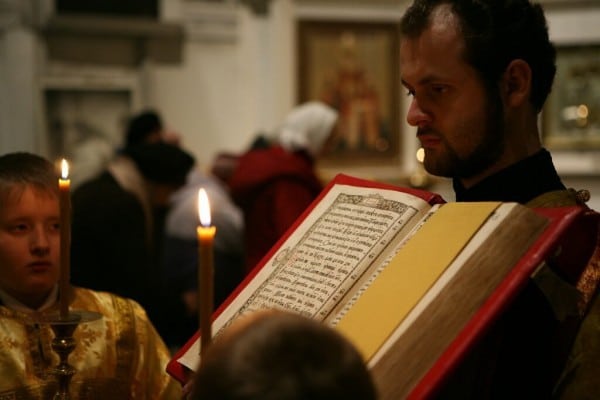How to explain to superstitious people that various signs have nothing to do with the Orthodox holiday?
The site www.pravmir.ru explains in a series of interviews of Oksana Golovko with Orthodox clergymen.
For some, the essence of the holiday is that on this day it is impossible to wash, cut your hair, and it is not desirable to work. How to explain to such people that all these signs have nothing to do with the holiday? Is it worth talking if you’re not being asked? And if they ask – how to answer correctly? Priests advise.
No unsolicited remarks
Archpriest Nikolai Sokolov, Rector of the Church of St. Nicholas in Tolmachi at the State Tretyakov Gallery, Dean of the PSTGU Missionary Faculty:
– It’s not worth it to specially approach and start to reason when you are not asked. There are things that you can comprehend by coming to the Church, reading the Holy Scriptures, knowing the faith from the inside, and not looking from the outside. From our unsolicited remarks and edifications, a person will definitely not immediately begin to become churched.
“No one goes to hell for food and drink,” said one priest. Everyone needs to take care of themselves, set an example – how a Christian should be – this will be the mission. Perhaps you will want to approach him later with questions. But to intervene with advice and explanations when we are not asked – this can have an absolutely opposite effect.
Yes, people do not understand the meaning of the holidays, they do not wash, they do not clean, they do not braid their hair, they climb to swim – this is their own business. What, the Lord will punish them for this? It is worse when people understand everything, they know, but they get angry and condemn.
If a person himself came up with a question, then it is important to answer not haughtily, that you have been in the Church for a long time, you understand everything, and he is so “uneducated”. Only a benevolent answer, with love, can be heard.
If you feel that you cannot explain and tell intelligibly, it is better to refer the person to the priest.
Not just “broadcast”
Abbot of the Nikolsky Monastery of the Omsk Diocese, hegumen Zosima (Balin):
– Before starting a story about a holiday or a church event, it is worth mentally asking for God’s help and mobilizing all your inner potential of benevolence and philanthropy. Without these two components, all your efforts will be in vain.
The success of half the business (at least) depends on the attitude with which you “missionary”. You need to be prepared for the fact that your interlocutor is not at all eager to plunge into the abyss of high theology. Start a conversation at the household level, about candles and which icon to put them on. And then tell about the content of the holiday and its deep meaning.
Beware of “dumping” all your spiritual and intellectual baggage on the interlocutor.
You don’t just need to broadcast, you need to see and feel the reaction of a person. Stretch the connecting threads to things that are familiar to him, for example, tell us which church in your area has the icon that the conversation was about. Suggest, perhaps, to stop by to pray and light a candle when a free minute appears.
Do not hesitate to ask yourself the question more often: “How would I build a story about a church holiday, or a revered image, or the life of a saint of God?”
And, most importantly, remember that the result always depends on the Lord and His all-good will, so as not to be upset if your sowing does not bear fruit immediately.
First step, second step, third step…
Archpriest Igor Gagarin, rector of the John the Baptist Church in the village of Ivanovskoye:
– It is impossible to give one answer to this question, to advise a recipe for all occasions. You need to have a sense of tact. Sometimes it is necessary to speak, to explain, and sometimes to remain silent. It all depends on the specific situation, on the interlocutor, on how ready he is to hear.
On the one hand, of course, we must testify to our faith and, if possible, tell people about it what we consider necessary. But this must be done wisely.
Everyone knows the expression “cast no pearls before swine” (Matt. 7:6). It does not mean at all that I should look at all people as if they were pigs. But I must soberly assess the situation and see if there is the right soil, falling on which, my words will bear the proper fruit.
People in most cases do not like when they are taught to live, they get annoyed when you start correcting them, pointing out something to them. We certainly don’t need that kind of reaction.
Trying to push a person towards faith is the best way to push them away from it.
So no need to push. But if you see that a person himself is looking for answers to some questions, he will gratefully accept what he hears from you, if you see that he himself is reaching out to find out, and not you are pushing him, this is a completely different matter.
It is necessary to talk about faith, but do it very carefully, tactfully, kindly, with love. And only if, I repeat, I have reason to believe that I will be heard, that a person will accept my words not as an attempt to impose something on him.
As for “stupid” questions… Don’t rush to consider them stupid. In a question about faith addressed to us, no matter how stupid this question may seem, there is always something right and healthy.
After all, if a person comes up and asks, for example, to advise an icon “for good luck in work,” you can look at the situation from two sides. On the one hand, there is some kind of magical approach. A person thinks that it is necessary to do this, this and that, and the result should be positive. We want to condemn.
But, on the other hand, one can look differently: a person understands that he does not have enough of his own strength, he needs help from above. Here he is asking for this help. But, since he has no church experience, he can do it clumsily and, at first glance, even stupid.
Treat this with respect, say: “It is very right and good that you have come and understand that you need to turn to God and the Church for help, that you are looking for the good, God, look for a saint who will help you in this conversion.” Well, then it is important to try to benevolently explain to him that the point is not in front of which icon what to pray for …
It is important not only what we say, but also how we say it. When we do this with patience, benevolently, perhaps expressing approval to a person, then there is a chance that we will be heard and understood correctly.
Goodwill, friendliness are indispensable conditions for successful missionary work.
It seems to me that we should always remember this in our communication with people who are only taking the first step in the Church, so that communication with us will awaken in them the desire to take both the second and the third…
Without illiterate demagoguery
Archpriest Maxim Brusov, Rector of the Trinity Cathedral in the city of Yakhroma, Dmitrovsky District, Moscow Region:
—Since the biblical gospel times, everyday missionary work has often acquired an instructive character. Missionary testimony, outside the context of personal experience, easily deviates into demagogy, most often illiterate. This situation can be leveled only by the “everyday” preaching of people who are theologically literate and have personal experience in applying these truths in their personal lives, compared with the experience of Christ’s Church.
Community is a counterbalance to personification and a guarantee that personal testimony is only the key to the door that opens the experience of the Christian life. The life of the Eucharistic community as a single family, the head of which is Christ.
If a person is not yet ready to enter the community, then there is another way – self-education. Ideal conditions have been created for this – a lot of literature, various media, it’s up to the little thing – the desire of a person to hear the word of the sermon, but this experience must also be compared with the experience of the people who make up the Church.
As for the issue of personal preaching, I think it is possible only in a situation where they want to hear you. Answers should be extremely honest, not hypocritical and not at odds with your life principles. Only in this case, it is possible to achieve the main goal of the Christian, even if it is a “domestic” mission – to awaken personal trust in Christ, in the Church, to awaken in a person the desire for salvation.
About shrines and shrines and how to deal with “Orthodox” superstitions, about the influence of superstitions on parish life and ways to combat this phenomenon in a conversation between Ksenia Smirnova and Archpriest Sergiy Rybchak, rector of the Peter and Paul Parish of the city of Polevskoy Yekaterinburg diocese:
The gospel is the main cure for superstition
If a person wants to understand what the spirit and way of life of a Christian should be, then let him open the Gospel, the epistles of the apostles, there is a lot of life literature. And see real examples. And how many examples of those worthy people whom the Church today glorifies as new martyrs!
When I came as a young priest to the parish of the Church of the Holy Apostles Peter and Paul, I encountered many superstitions. Unfortunately, the priest who was in front of me turned out to be their breeding ground. He did not have any spiritual education – then there was a huge need for clergy, churches were returned, there was no one to serve, and the first believers who came across were appointed. There was no one to explain.
For a whole year or more, I gathered parishioners in the temple two or three times a week and simply talked with them. We read the Gospel, I explained to them what Christ teaches, what the apostles teach, what the Church teaches, and from everything else that is not connected with this or contradicts this, you move away. I didn’t break anyone, I didn’t try to immediately stigmatize, they say, you are ignorant of the law, I tried to approach delicately. But he taught them to check all the traditions based on the Holy Scriptures and Holy Tradition. Here are the two pillars!
And until now – and I have been in this parish for 21 years – every Sunday we gather in the assembly hall, and I talk with parishioners. We meet with those who are preparing for baptism for two or three months, we try to answer all the questions and instill at least some interest in the true source of knowledge – the Gospel and the teachings of the holy fathers.
There will always be superstitions. This is how a person works: even without the virtues of love and humility, he will be driven by fears: for his life, for his loved ones, and since fear lives in the heart, it gives rise to all sorts of monsters.
What to do if you were “made to death”
– What do you say to people who come and complain about damage or the evil eye?
– I often come across this: “I was jinxed” or “I was made to die” – these are, as a rule, believers, but absolutely non-church, and therefore it seems to them that there is some power that is greater than God.
Since they do not know God, they do not have real faith and experience of life with God, they have a dualistic view of the world: there is good, there is evil, but evil is more insidious, so it must be fought with some specific ways. On the one hand, this may be true, but it is terrible for them when they endow evil with such supernatural abilities, stronger than those that are given in gifts from God.
Modern man lives in constant stress. The radio will turn on: everyone is shouting that the ruble has fallen, the dollar has risen, the war is on, famine is approaching, and then there is the boss or subordinates, stupid, eternal stress in the family. And it turns out that the most difficult thing for a person is to go to repentance.
To repent is a real reversal, a real change in his life. No wonder many people are afraid of this. They think that you will come, and they will turn you inside out, as if under interrogation, so that you will definitely enlighten all your dark corners of your soul at once.
No, repentance comes from the moment when a person becomes acquainted with the teachings of Christ. When he begins to compare: what did Christ teach? How do I live? And when a person understands this, he slowly begins to pray and change his way of life.
The main thing for people who believe that they have been jinxed or spoiled is to calm down and then come to the temple. At least stand, pray, and if possible, talk with a priest or a reasonable, spiritually experienced person.
– Archpriest Alexander Avdyugin, a writer, told the following story on his page on the Internet: one big boss, whom he knows, called him almost at night, sent a car for him. The family is very educated, people go to church, go to confession, take communion. They complain to the priest: an envelope arrived without an address, they opened it – either dust or earth fell from there, waking up on the carpet. And some curses on a piece of paper. Father Alexander, on the way to the house, sees that they are already burning a carpet in the yard. Panic is complete! He barely kept them, so as not to burn the floors. Despite their education, these people insisted that a rite be performed to neutralize evil. Batiushka fought back somehow, but the next day he went to meet them and consecrated the apartment…
“Yes, it happens all the time. A few days ago, I had a similar situation: a person met another person, and he said to him: “Something I look at you – I feel that you have been spoiled for death. You look for yourself: somewhere this special artifact lies, it must be found.” I even described to him how this artifact should look: some kind of needles and threads.
And what do you think: finds! (I’m already wondering if this is the same pest that put this artifact in?) And he’s hysterical: “I felt that something was happening to me! I understood that I was dying, but I did not understand why and how! But he is a believer, coming on holidays. As we say about such: Christmas, Easter.
It is useless to convince a person in such a state that “according to your faith, let it be done to you”. When a person is drowning, it is pointless to explain to him how to breathe and move his arms, you have to pull him out. So it is here: we reassure the person, we promise him to come tomorrow and consecrate the dwelling. We consecrate, and then sit down to drink tea and calmly talk over tea. The conversation comes about confession, I say: first read about the commandments.
If a person is really preparing for repentance, then in an amazing way the Lord begins to admonish him: he begins to see something more than he would like to say in confession. And the invariable action of the grace of God at confession happens every time, a person begins to understand that something is wrong in his life, so all sorts of rubbish and sticks, all sorts of “clairvoyants” and psychics bring him to hysteria.
This is where our economy lies.
And if someone does not understand about the light of Tabor …
– There are many superstitions associated with the names of church holidays. Many priests criticize such names as “Nut”, “Apple Spas”, saying that this is on the verge of blasphemy. But one priest recently wrote on the net: “Don’t you understand that today for the vast majority of ordinary and not ordinary people, our Orthodoxy plays only a festive and decorative, elegantly ritual role, in order to somehow brighten up our fragile, gray, poor national existence? And on the other hand, you might think: who needs that invisible, uncreated light of the conceptual and speculative schemes of the theologian Palamas!”
– There is no need to panic about the ignorance of our people – it has always been, at all times. When the Lord comes to God’s chosen people, when the fullness of time has come, how many people believe in Him? After all, the Lord Himself preached! After all, He did not leave a single note – He showed the way by His example, and He said about Himself: “I am the way and the truth, and the life, and whoever wants – follow Me.”
Surprisingly: He calls for himself, He does not drive anyone. Therefore, we should not drive the people anywhere by any kind of theology. If you are a theologian, it’s good – it means that you have been given more than another person. But for this the Lord appointed shepherds, that shepherds should teach. If there is no shepherd, then the sheep will be scattered, they will be kidnapped by wolves and thieves. So it was at all times.
Here we can recall the words of the Apostle Paul to his flock: when you were babies, I fed you with milk, but when you matured, it’s time to take solid food. The people are like children: they are incapable of digesting the solid food of theology about the uncreated light. Even in seminary, only one or two students are able to understand the theology of Simeon the New Theologian or Gregory Palamas. The rest can only memorize certain texts in order to pass the exam. And so it is with priests.
Therefore, there is no need to be discouraged. We must do missionary work and teach the people, each in his own place: a priest, a deacon, a church-going and sensible layman—all must, with their light, their good life, as the Lord commanded, teach others to glorify the Heavenly Father.
I think that you should not despair because you have learned high truths, and your loved ones cannot perceive these truths. We learned the truth not in order to shove it into someone, but in order to become even more merciful, caring, sacrificial. Thank God, if our knowledge is manifested in this, and if we become angry at our neighbors from high truths, then it is better not to know such truths.
The kindness of grandmothers and the swagger of theologians
– And what is worse: a kind, merciful person who shows active love for his neighbors, but with some kind of superstition, or a theologically enlightened person, but far from the Christian model in life?
– “According to your faith, let it be done to you” – deeds testify to our life, whether it is Christian. From the patericons it is known that the venerable ascetics, out of ignorance, had doctrinal errors, because there was no one to instruct them. It happened that the saint mistakenly taught others, but when he learned the truth, he repented and asked for forgiveness from everyone.
I also found those righteous grandmothers who lived in remote villages during the Soviet era, they worked, prayed, raised their grandchildren, and the grandchildren flew to their grandmothers at the first opportunity. And forever preserved the memory of the kindness and prayerfulness of these old women.
I myself had such a grandmother, she never forced anything, but she was always very kind, I saw how she prays. This is an amazing example, which then remains for life. Although she was not theologically educated and would hardly have been able to adequately answer my questions, she covered all my future questions with her love and prayer.
I also saw very educated people, with degrees of candidates of theology and even higher, and it was not always pleasant to sit at the same table with them … I did not meet such swagger and cynicism even in secular people.
“Let’s sit on the path”
– Indeed, a man recalls his grandmother, who was both kind and prayerful, but said: do not sew up anything in front of the road. And a person gets the feeling that there is nothing terrible in such superstitions …
– There are such signs in which there is some real background, but later they forgot about it. For example, as a child, I was very fond of reading Maurice Druon’s “The Damned Kings”, this is an epic about the French kings. There was an interesting plot there – the order of the Templars was destroyed on October 13, 1307, and this was on Friday. When I got older, I heard all sorts of horror stories about Friday the 13th. Recently I also heard from students – and told them about Druon’s books, which they had not even heard of. They were very interested.
And “sit on the track”? I still remember and always do this: before going out, I “sit on the path” with only one purpose – to remember if I forgot my documents, money, keys. Obviously, this is a good sign.
Church superstitions and signs are often associated with ignorance of the Holy Scriptures. To celebrate birthdays or not to celebrate? Then a sect of Jehovah’s Witnesses appeared, they forbid celebrating a birthday. And very many parishioners asked: they came to us, told about faith and said that in no case should you celebrate a birthday, is that right? Because just the murder of John the Baptist happened on the birthday of King Herod.
Well, a sect is understandable, they can preach anything they want. But Orthodox Christians must clearly understand where everything comes from and explain to others.
Why do we need a shrine dangling on the arm?
– And how do you feel about the fact that the Church is not free from this? We advertise all sorts of security rings with prayers, measuring icons – they say, this icon will save your child, the Burning Bush icon will protect your home, etc.
– Of course, this is advertising and cheap exploitation of human fears. At the wedding, the rings are always consecrated by the fact that before the betrothal, the priest brings them to the altar and places them on the throne. In Soviet times, these were ordinary rings, but now there are rings decorated with prayer and church symbols. But these are not security rings. These are wedding rings. How many people are getting married? And the production of rings has been established, where should they go? And everyone is starting to be encouraged to wear these rings.
As a dean, I regularly turn to fellow priests who bring bracelets with images of the Virgin and saints. I myself categorically forbid selling such things in my temple.
I have my own argument: you cut out photos of your dad, mom, loved ones – and on their bracelet, and wear it that way. Nobody does it! How is it that my children will hang on my arm? But if you do not do this with the image of your relatives and friends, why do you not feel that this is blasphemy in relation to the image of the Mother of God and the Savior? Where is your reverence?
It is believed that if a prayer is printed on the belt, then this belt will protect you. I agree: wear such belts, other artifacts. But on one condition: if you remember that you have such a strap, then pray to the Lord God. Such things are intended only to remember the prayer to God, because sometimes a person is so busy with fuss that he forgets both about God and about his neighbor.
I always advise our graduates from the rehab center (rehabilitation center for drug addicts “Spider”, which takes care of Father Sergiy – ed.), I always advise them to buy a rosary. But not to do smart work. It’s simple: you go, you go, you reach into your pocket – oh, I have a rosary here, which means you need to pray.
And if someone says that this in itself protects a person, these are the same superstitions. Even if you drink a ton of holy water, eat a ton of prosphora and then sit in a car thrice consecrated – you can still get into an accident with the same probability as if you don’t do anything. You need to pray, and not surround yourself with amulets!
Belief in amulets is a tragedy of faith
“But prayer by itself does not protect a person from an accident either, and priests die in accidents, and prayer books …
Yes, if we understand that we must surround ourselves with prosperity in this life, then this is a tragedy. And if we understand that we are preparing ourselves for the life of the next century, for eternity, then such events are not a tragedy for us, this is a transition to a world where you are not only an expected guest, but a permanent resident. And if the whole meaning is focused only on this life, then a person is ready to give everything, if only everything was fine.
Superstition is what prevents you from properly adjusting your spiritual life. And it should be tuned to salvation and relationships with God and neighbors.
The holy fathers say that the main thing for a Christian is not the acquisition of some supernatural properties of the body or soul, but the acquisition of sobriety. Many fathers prayed that the Lord would grant them the gift of reasoning.
The Lord called his teaching the source of living water: if you drink from this source, you will never be thirsty. But superstitions just constantly give rise to thirst: no matter how much you drink from this foul-smelling vessel, you will still be thirsty forever.
Photo: azbyka.ru















